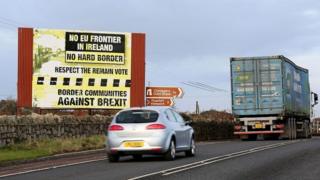 Image copyright
Image copyright
AFP
No 10 says it is confident a deal can be done to avoid a hard border on the island of Ireland after Brexit despite signs of an impasse over the issue.
The BBC understands UK plans to resolve the matter faced sustained criticism from the EU at a meeting on Wednesday.
The UK wants to use technology to help goods flow freely and avoid regulatory alignment between the North and South.
Downing Street said it did not recognise reports it had been told none of its proposed ideas would work.
The EU wants to present an agreed solution on the issue to a summit meeting of European leaders in June.
Chief negotiator Michel Barnier told French TV on Friday that 25% of the final withdrawal deal had still to be settled and it could still be derailed by disagreements over the border and other issues.
Britain is due to leave the European Union on 29 March 2019.
December’s first-phase agreement – officially known as the Joint Report – contains the “backstop” option of continued regulatory alignment between Northern Ireland and the Republic of Ireland in many areas.
- Brexit divorce cost ‘uncertain’
- Senior MPs to force customs union vote
- What have EU leaders agreed so far on Brexit?
The UK is strongly resisting this, as it believes this will effectively see Northern Ireland remain in the EU’s customs union, which Theresa May is committed to leaving.
The UK hopes to avoid this outcome either by agreeing a very close economic partnership with the EU, which it believes would make physical checks on the Irish border unnecessary, or the use of technology to keep goods flowing freely as they do now.
The BBC understands that at a meeting on Wednesday with top UK officials, the EU’s deputy Brexit negotiator, Sabine Weyand, went through the UK proposals “line by line” and explained why from the EU side they had not changed sufficiently since previous negotiations and were still unacceptable.
Image copyright
Reuters
The UK has reportedly been warned of the need for “full compliance” with rules on agricultural products
An EU source said there would be more talks in the coming weeks and opportunities for the UK to come back with fresh proposals ahead of June’s summit.
The Daily Telegraph said it had been told the UK’s plans for Northern Ireland had been subject to a “systematic and forensic annihilation” in what it said was a “detailed and forensic rebuttal”.
The paper also claimed that the UK was told it would have to ensure “full compliance” with EU rules on goods and agricultural products if it wanted to prevent customs barriers.
The BBC understands British officials do not take the same view of the meeting and point out that the EU has long been sceptical about the UK’s position.
‘Fantasy model’
Theresa May’s official spokesman said the UK would continue to work with the EU to find a solution “that works for everyone involved”.
“We are confident that in the coming months if all sides work together productively we can achieve a solution,” he said.
“We have been clear that the UK is leaving the customs union and we need to find a solution that protects things like the Belfast agreement, avoids a hard border between Northern Ireland and the Republic of Ireland and protects Ireland’s place in the UK internal market. That continues to be our focus.”
The UK’s former top official in Brussels, Sir Ivan Rogers, said he believed the European Commission and many EU states, in particular the Republic of Ireland, believed the “backstop” option was the only viable solution.
Speaking in London on Thursday, he suggested proposed economic solutions for avoiding a hard border were regarded as a non-starter because of the UK’s decision to diverge from the EU by leaving the single market.
“The Brits are therefore focused above all on option B – the technological solution. That, candidly, from everything I’ve heard from various places is still viewed as a bit of a fantasy island unicorn model”.
Lack of progress on the issue would increase domestic pressure on Theresa May, who is facing growing calls within Parliament for the UK to remain in the EU’s customs union – which ensures no internal tariffs between its members but prevents states from negotiating their own trade deals with other countries.
MPs are pushing for a vote in the Commons next week on remaining in some form of customs union after the government was defeated on the issue in the Lords on Wednesday.
The BBC has been told that political uncertainty in the UK, and the prospect that Parliament could force a change in UK customs policy, may be strengthening the EU’s resolve not to budge on the issue at the moment.
Brexit: No 10 still ‘confident’ of Irish border solution

